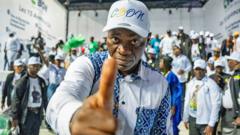Gabon prepares for elections under Brice Clotaire Oligui Nguema, a leader promising democratic reforms after a military coup, setting a contrasting example to his peers in the region.
**Gabon’s Leadership Shift: Oligui Nguema’s Pledge for Democratic Evolution**

**Gabon’s Leadership Shift: Oligui Nguema’s Pledge for Democratic Evolution**
In the face of militant uprisings across Africa, Gabon's coup leader opts for democratic elections—illustrating a unique political pivot.
Following the military coup that ousted the Bongo dynasty after more than five decades of rule, Gabon is bracing for a significant electoral event. Former military leader Brice Clotaire Oligui Nguema unveiled his bid for the presidency, pushing Gabon towards an encouraging democratic transition unlike the trend observed in many African nations where military regimes often refuse to relinquish power.
Having replaced his military uniform with formal attire, Oligui Nguema leads the race with a commanding presence, buoyed by popular sentiment grateful for the end of dynastic governance. With seven other candidates contesting, his catchy campaign slogan, "C'BON," plays cleverly on the French phrase meaning "it's good," boosting his appeal as a representative of change.
His most formidable opponent comes from within the old regime—former Prime Minister Alain-Claude Bilie-By-Nze. Despite facing controversies regarding electoral regulations that barred crucial challengers from running, Oligui Nguema has garnered significant public backing, making prospects for a second-round runoff less likely. Gabon, an oil-rich nation with a populace of over 2.5 million and natural resources that fuel foreign interest, stands on the brink of transformation.
Oligui Nguema’s ascent to power came through a remarkably peaceful coup in August 2023, which followed allegations of a contested election victory by Ali Bongo Ondimba, the former president. Bongo's attempts for a third term sparked public dissent, culminating in military intervention that was welcomed by many Gabonese amid fears of a persistent unpopular dynasty.
Distinguishing himself from other military leaders in Africa, who have employed crackdowns on dissent and media freedoms, Oligui Nguema has opted to foster inclusivity by incorporating diverse political voices into governance. In addition to ensuring the release of political detainees, he has engaged with Gabon’s civil society, addressing tensions more collaboratively.
On the international front, Oligui Nguema's administration has maintained positive relationships with France and sought to foster goodwill with other international actors, contrary to the hostile stances taken by counterparts in regions like West Africa. Recent cooperation between Gabon and France indicates a commitment to formal governance, with a plan to convert a military base into a joint training center.
However, real challenges loom for Oligui Nguema post-election, should he win the presidency. Public expectations soar as citizens yearn for unprecedented change, particularly in areas of social development and environmental conservation. Gabon prides itself on rainforest conservation yet faces pressures for resource extraction and job creation. The new leader must navigate these complexities adeptly, staying attuned to both rural and urban constituencies.
Oligui Nguema’s approach symbolizes a refreshing departure from prevailing trends, aiming to strike a balance between economic aspirations and democratic principles. As he prepares to assume potential leadership, the spotlight will remain on his governance, with the Gabonese populace awaiting not just promises but meaningful actions to address their needs.


















